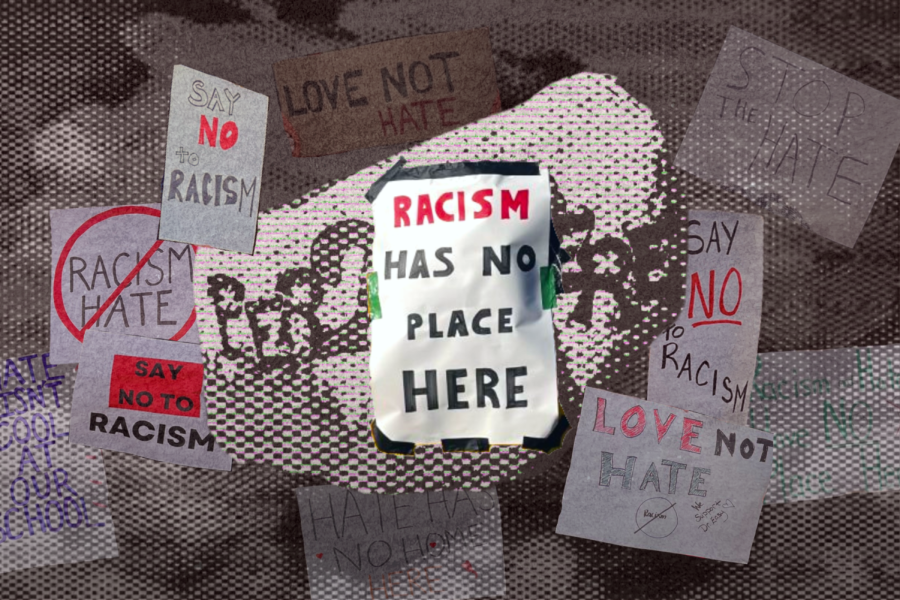Editorial: Speak out against racism in Wayland
Credit: Alyssa Ao
WSPN’s Editorial Board discusses the impact of last month’s racist graffiti found at WHS and its impact on the community.
January 17, 2023
On Dec. 21, 2022, students arrived at Wayland High School to see graffiti on an outside wall of the Wayland Community pool, using a racial slur that targeted Dr. Omar Easy, our superintendent of schools.
This act of racism comes with its own backstory, context and set of problems that many people are not aware of, making this a complicated issue for the general public to properly discuss. We’re not here to speculate on minute details about the superintendent, his actions nor the parties involved in the events that led up to this act of hate. Further, the majority of our editorial board are not individuals of color. We know that our role is not to represent and speak for those directly affected by acts of racism. However, we feel the need to speak out as a student publication and condemn hatred in our community.
The racist graffiti on the side of the pool personally targeted Easy, a respected leader in this district. This incident serves as an important reminder of just how pervasive racism can be – despite Easy’s accomplishments and authority, he can still be diminished personally and professionally through his race. This is a condition people of color face in America.
In American society, race undeniably affects people’s interactions and access to opportunities in life. It provides privilege to some while making others vulnerable. To attack someone based on their race is to demean an intimate part of their identity. Now, facing racist incidents in our schools on an almost annual basis, Wayland has to ask itself: How informed are we about racism as a community? Why, despite commitments to progress from so many town leaders and residents, does this continue to happen?
After the racist graffiti was found on the side of the pool, people posted on Facebook and administrators emailed the public. A few comments said “this is not Wayland” or “Wayland is better than this.” Comforting? Maybe. Helpful or productive? Not exactly.
To suggest that racism is a foreign concept in Wayland, or to declare that it will never happen again, dissociates ourselves from the problem. Apart from the most recent racist graffiti, there were also racist incidents at the middle school just over a year ago. Even before these incidents, the Anti-Racism Resolution was put in place as a promise that Wayland Public Schools would be an anti-racist institution. However, when WHS students were polled about their knowledge on the resolution, 85.6% of respondents said they didn’t know about the resolution.
Racism doesn’t just come in the form of graffiti on the wall of a public building. It’s not always so blatant and simple to condemn. In our schools, racism comes frequently in the form of microaggressions that target members of all communities of color through the use of stereotypes and other subtle methods. However, as more egregious acts of racism happen at the same time, microaggressions become normalized in comparison.
Racism is an issue in every aspect of our community, but comprehensive anti-racist work is needed in our schools the most urgently, especially when students of color are saying that they feel unsafe at school.
Though students don’t have the authority to fix this issue themselves, there are still small steps we can take as a student body to address this issue. The Boston Parent Council designated today as a Day of Impact to acknowledge the impact of racism in our community. Consider taking some time out of your day and use it to educate yourself on these issues. Additionally, aim to have honest conversations with your peers of color today and everyday. As students, we have an obligation to try and understand our classmates, their backgrounds and how they feel about this issue in school.
There must also be a permanent, preventative solution in our schools that works to educate against systemic racism, such as a mandatory curriculum that educates every student on the background of racism in America, and starts at the elementary level. When students are educated about this issue in their earlier stages of life, they will be able to identify racism and its harms in society. An understanding of America’s past of slavery and exploitation is essential to anti-racism.
Combating racism is not an easy thing to do. No one expects this problem to be solved immediately. The first step in addressing this issue is recognizing that people of color have been harmed by every racist idea and word that has been spoken in this town, and when their calls for change continue to not be met. We know that Wayland can be better than that writing on the wall, and we are the ones that have to ensure that.
The people of color in this town have made it clear what they need from this community. It’s about time we listened.
Editorials reflect the views of the majority of WSPN editors.





![Last Wednesday, the Wayland School Committee gathered to discuss a number of topics regarding the health curriculum and Innovation Career Pathway course. Another large topic of conversation was the ways to potentially mitigate distracting cell phone usage. "These [phones] are going to distract your learning and social relationships," Superintendent David Fleishman said. "That's concrete right there."](https://waylandstudentpress.com/wp-content/uploads/2025/06/Screenshot-2025-06-04-at-9.49.31 PM-1200x886.png)



























![Troy Hoyt finishes the Boston Marathon, running for the Hoyt Foundation. T. Hoyt is the son of Hoyt Foundation CEO Russ Hoyt.
“[Running a marathon] might seem like a big thing, when it’s presented to you at first, but if you break it up and just keep telling yourself, “Yes, you can,” you can start chipping away at it. And before you know it, you’ll be running the whole 26 miles, and you won’t even think twice about it.” T. Hoyt said.](https://waylandstudentpress.com/wp-content/uploads/2025/04/C36E8761-1CBB-452E-9DF2-543EF7B1095E_1_105_c.jpeg)













































